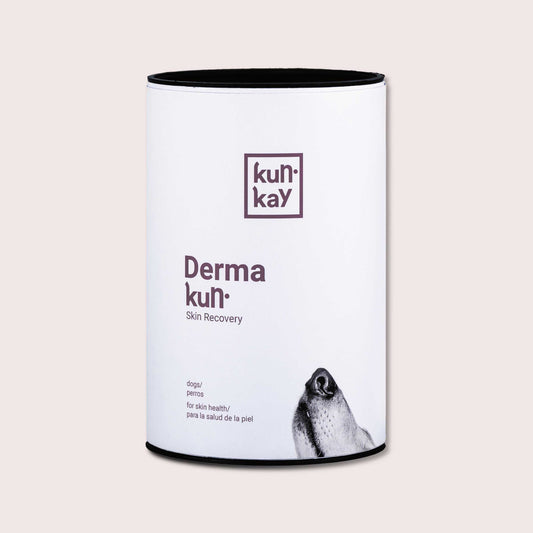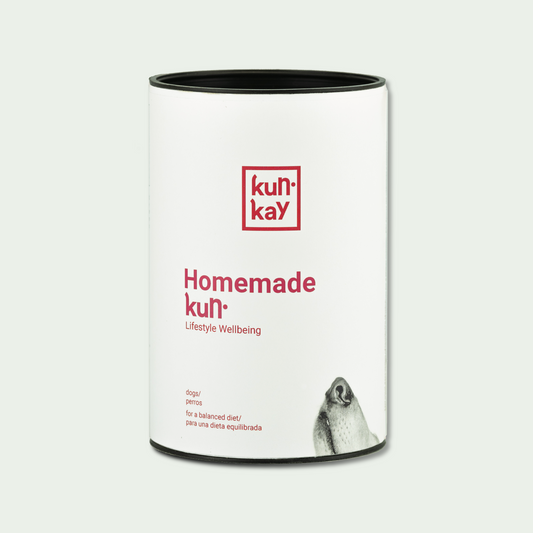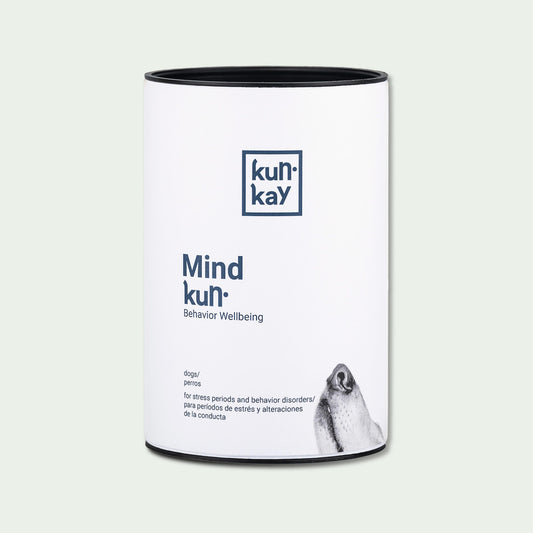Cargando...

When we share our lives with a canine companion, it is essential to know what food dogs can eat and, much more importantly, what types of foods that can make them feel bad or are directly toxic for them.
Some of the foods that we humans like the most, such as chocolate, cheese, or peanuts, are not good for our dogs. As much as their puppy eyes indicate otherwise, there are foods that are better not to share with our best friend.

This does not mean that dogs cannot eat “human food”. In fact, at Kun-Kay we make our pet supplements using natural ingredients that are completely suitable and safe for themsuch as some vegetables, meats or fish, for example. Our products can be added as a complement to their feed and in addition to taking care of them, they also have flavors that they love. Go ahead and try them, your dog will have iron health and, what's more, they will scrape the plate clean!
At Kun-Kay we help you keep your dog healthy, strong and happy with our products and also with our advice. This time, we've prepared a guide with the foods dogs can eat and the foods they're not recommended for. Stay with us and take note of all the key points! Can dogs eat fish or shellfish?
Dogscan eat most fish and shellfishand, in addition, these have many beneficial properties for them because they are agreat source of protein low in saturated fat. Most dogs love seafood such as shrimp, clams, octopus; as well as fish and shellfish. You can give them as a treat to help take care of their immune system and improve the health of their skin, hair, and joints. Dogs can eat both white and oily fish although it should be noted that oily fish have a higher caloric intake so it is not recommended for dogs that tend to be overweight, although they also provide more omega 3. Some of the most recommended fish for dogs are hake, tuna, salmon or sardines. They can be consumed raw, although it is better to cook them first to eliminate the presence of possible bacteria and parasites. Seafood, on the other hand, can be consumed, although occasionally and in small doses because they can provide too many calories and your dog may have trouble digesting them in large quantities, which can cause diarrhea, vomiting, and other gastrointestinal problems. Dogs can eat most fruits and many love their taste although you need to be careful about possible allergies and four specific fruits: grapes or raisins, currants, cherries, and avocado. Some dog-friendly fruits that also have health benefits are the following: Like fruit,most vegetables are suitable and beneficial for dogsalthough you have to be careful because some are harmful. Specifically, dogs cannot eat garlic, onions, tomatoes, mushrooms, potatoes, and rhubarb. There are many other vegetables that are suitable for dogs and beneficial to their health. These are some of the most important: The vast majority of dogs are lactose intolerant and cannot eat milk, cheese or yogurt. Although most people love the taste, with a few exceptions, lactose-containing products cause gas, diarrhea, and other intestinal discomfort. As a curiosity, although we are used to seeing them in series and movies drinking a small saucer of milk, the same thing happens to cats. Meat is another “human food” that dogs can enjoy, especially if it’s chicken, turkey, or beefandas long as there are no bones or pieces with too much fat. If you want to give meat to your four-legged friend, we recommend always cooking it and cutting it into small pieces so that it doesn't choke. Important: If you're going to give meat to your petit's best to avoid bones, especially if they're raw. Chicken bones are especially dangerous because they can cause choking, while with other raw bones we run the risk of them splintering and hurting them when swallowed. In addition to the foods we mentioned in the previous points, dogs can also eat broth as long as it's unsalted (one tip to enrich their meals is to hydrate their food with a rich broth). They can also eat honey, plant-based or lactose-free yogurts, olive oil, and eggs. Neither salt nor sugar nor other sweeteners are recommended for dogs. Excess salt can be harmful to their circulatory system and kidneys as they will tend to drink and urinate more to try to eliminate it; Salt is also strictly prohibited for overweight dogs because it can cause heart failure. Sugar and other sweeteners are also not recommended. Among other problems, sweets can affect your pet's vision, causing them to go blind. As we mentioned in the introduction, it is just as important to know what foods dogs can eat as it is to know what foods should be strictly prohibited in their diet. We tell you which are the five foods that you should never give to your furry friend: All natural supplements for dogs are designed to help you solve specific problems and prevent their appearance. For example, in our article on the use of chondroprotectors in dogs since we told you that Arthrokun, for example, is a natural supplement for dogs specially designed to help you take care of their joint health. Another of our star supplements is Enterokun Mild, focused on strengthening the intestinal health of your four-legged companion. Enterokun will be a great option if your dog has eaten something unsuitable for dogs and it has upset his stomach, since one of its uses is, precisely, to relieve stomach discomfort and combat diarrhea and constipation, among many other applications! We recommend the Barf Diet as one of the important options for your pet. If you want to know more about which type of Kun-Kay supplement is most recommended in each specific case or you are wondering what nutrients, vitamins and minerals your dog needs to grow healthy and strong, don't miss our guide on the different types of vitamins and supplements for dogs. There you will find all the information you need!
2. Can They Eat Fruit?

3. Can dogs eat vegetables?

3. Can they eat dairy?

4. Can They Eat Meat?

5. Other foods they can eat?
6. Can they eat sweetened or salted products?

7. Foods Strictly Forbidden for Dogs









